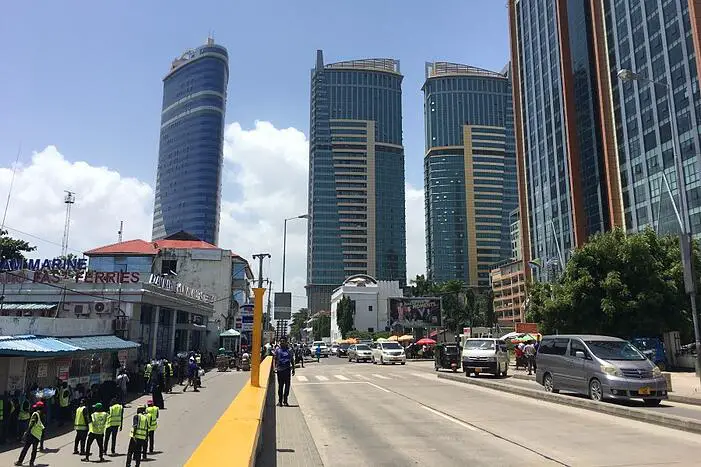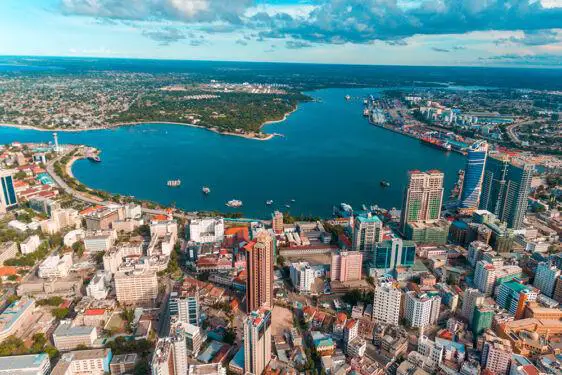- Africa’s new dawn: the rising role of digital and AI in agriculture
- Can Dangote Refinery Transform Africa Energy Ambition
- Gallup Survey: 80 per cent of Kenyan Workers Are Disengaged and Seek New Opportunities
- Madagascar Man Freed from 5KG Tumor After 15-Year Struggle
- How women in Africa are perceived and treated
- Sugar consumption in Kenya to Increase to 1.23 Million Tonnes
- Can Somalia and Turkey Oil deal Bring Change in Somaliland
- Remittances to Kenya dropped to $371.6 million in June, marking a six month low
Browsing: BoT
- Gold exports accounted for 43 per cent of goods exported by the year ending September 2021
- The Tanzanian shilling is argued to be stable against the US dollar
- Still, debt is a thorn to the Tanzanian government as it stands at more than $33 billion
The central bank of Tanzania released its monthly economic review report on 11 November, for October 2021, and it depicts the economy to be stabilised, despite a few sectors showing some decline in performance.
One of the most promising notes in the report is the stability of the shilling against the US dollar, “trading at an average rate of Tshs. 2,309.62 per US dollar in September 2021, compared to Tshs. 2,310.88 per US dollar in the preceding month,” the report noted.
Inflation
On this crucial sector of the economy, the report noted that inflation remained within the target of 3.5 per cent for the years …
As the world and the East African region continue to recover from different kinds of economic shocks triggered by Covid-19, inflation in Tanzania has also taken different turns. According to the review, in August 2021, twelve-month inflation remained at 3.8 per cent, which is noted to be the same, as the last month.
On the other side of the fence, the review showed that core inflation—of which its index calls of the largest share in consumer price index (CPI), rose to 4.5 per cent in August 2021 from 4.1 per cent in July 2021, this is attributed to the increase in transport costs, “reflecting an upward shift in fuel prices”.
Things seemed to work better in food inflation, whereby annual food inflation—excluding alcoholic beverages, slimmed down to 3.6 per cent from 5.1 per cent, the review argues that this is due to a decrease in prices of maize and maize …
- Energy, fuel, and utility inflation increased to 5.1 per cent in August 2021 from 3.6 per cent in July 2021
- 12-month inflation remained at 3.8 per cent which is the same rate as the previous month
- Interest rates charged on loans by banks remained unchanged
The Tanzania Central Bank (BoT) released the monthly economic review last week, which breaks down the performance of different economic sectors, of which most portions of the economy portrayed modest performance.
Inflation
The report showed that, in August 2021, twelve-month inflation remained at 3.8 per cent which is the same rate as the previous month, and below the country target of 5 per cent in 2021/2022.
Further, on that line, core inflation which BoT argues, is the index accounts for the largest share in consumer price index (CPI), increased to 4.5 per cent in August 2021 from 4.1 per cent in July 2021—this is attributed …
The central bank of Tanzania (BoT) has painted the state of the economy on a different canvas.
BoT’s economic bulletin for the quarter ending June 2021 and the monthly economic review for July 2021 indicates Tanzania has been on a very promising trajectory for the past two years, shown by its dedication towards building a resilient industrial economy and self-reliance through steady ownership and control of natural wealth.
According to the BoT, in the quarter ending March 2021, the economy grew by 4.9 per cent compared with 5.9 per cent in the corresponding quarter in 2020 and four sectors were noted to have contributed greatly, namely construction, transport, agriculture and storage.
Former hotbed sectors and speedy forex contributors such as accommodation and restaurants were gravely impacted by the pandemic, slapping a -1.7 per cent performance for 2021.
By the end of March 2021, the growth and expansion of telecom in …
The central bank of Tanzania (BoT) released the monthly economic review report on Wednesday, August 2021. The report brought various in-depth details on the performance of the life-pumping sectors of the economy in Tanzania, including exports, imports, and money supply.
Inflation
Tanzania has managed to sustain the inflation to a considerate level over the past month; hence in the recent report, the East African country has continued to keep the inflation on a low level and within the benchmarks set forth at national and regional levels.
The report argued that this is attributed to sufficient domestic food supply, stable exchange rate, and prudent fiscal and monetary policies.
“Twelve-month headline inflation increased to 3.6 per cent from 3.2 per cent recorded in the corresponding period in 2020 and 3.3 per cent recorded in May 2021. The increase was mainly attributed to an increase in prices of non-food items”, the Bank of …
The Central Bank of Tanzania (BOT) published the monthly economic review on June 2, 2021, highlighting key economic performance in the country’s different sectors.
Tanzania’s key economic sectors such as exports and imports showed modest performance while inflation remained in tolerable benchmarks.
The East African nation is one of the fastest-growing economies in Africa and it has been on a trajectory to enhance its economy, including advancing to a lower mid-income level, amid uncertainties caused by the global pandemic.
Read: Report Insight: Central bank shows good prospects on Tanzania economy
Various forecasts by different entities including the World Bank (WB) project that Tanzania’s GDP will grow by 4.5 per cent in 2021. However, the global recovery period dictates the fate of its economy.
Inflation
According to the report, headline inflation continues to be within the country and regional benchmarks in May 2021.
“Twelve-month headline inflation remained at 3.3 per cent …
The central bank of Tanzania released the monthly economic review for May 2021 and it has reviewed different sections of the economy with a keen eye.
READ:Tanzania clock’s $3Bn as gold prices soar
Inflation
In this section of the economy, the report showed that, during April 2021, the headline inflation rate remained low and within the country and regional limits.
“Twelve-month headline inflation was 3.3 per cent in April 2021, almost the same as in the preceding month and the corresponding period of 2020,” the report noted.
However, on a month-to-month basis, headline inflation stood at 0.5 per cent, which is a bit higher than the rate registered in the corresponding period of 2020 inflation is projected “to remain within the targeted band for 2020/21”.
Further, the core inflation showed that the index accounts for the largest share in consumer price index (CPI) stood at 3.5 per cent, which …
Tanzania economy is projected to grow at 5.6 per cent, the central bank of Tanzania (BoT) revealed during its May 28, 2021, Monetary Policy Committee (MPC).
As Tanzania ascend towards marking a year since upgraded to a low-middle-income country, it has been taking serious steps to revamp its economy, by reshuffling its investment and trading operations.
Unlike 2020 whereas the entire world was battling COVID-19 this year the MPC noted that it was “pleased with good performance of the economy, which is amid global spillover of the adverse impact of the pandemic. Growth is estimated at 4.8 per cent in 2020, lower than the projection of 5.5 per cent, reflecting the adverse impact of the pandemic”
Further, the committee noted that the economy in 2021 will be reinforced by several sectors particularly construction, agriculture and transport and communications activities.
These projects are rather quite far from the African Development Bank …
The central bank of Tanzania’s economic bulletin for the quarter ending March 2021, analyzed the economic performance of the Zanzibar-semi autonomous region of Tanzania, which is widely known for its exotic tourism experience and spice farming.
The detailed report brought up interesting issues along the lines of clove production, inflation, public finance, imports, and exports.
READ:How Zanzibar’s presidency 100 days in office cast economic prospects
Clove performance
Zanzibar has marked its spot across the region within clove production over the past decade, hence over the past years, performance in the sub-sector has been dwindling.
According to the bulletin, “There were no cloves procured during the quarter under review due to low global demand, which resulted in a significant decrease in prices. As for seaweeds, 2,770.6 tonnes were procured compared with 2,236.5 tonnes procured in the corresponding period in 2020,” BoT report.
On the side of the aisle, Statista—a world …
The central bank of Tanzania (BoT) released a monthly economic review report this week the report depicted the performance of different sectors of the economy.
Inflation
Tanzania has been maintaining its inflation rate over the past month in 2021. According to this monthly report, inflation has continued to remain down, evolving within the country and regional targets.
The report argued that the twelve-month consumer price index (CPI) headline inflation eased to 3.3 per cent from 3.5 per cent in the previous month, which is rather widely driven by the slowdown in prices of non-food consumer goods and services.
“On a month-to-month basis, headline inflation was 0.9 per cent in February 2021, compared with 0.8 per cent in the preceding month. Inflation is projected to remain within the target range of 3-5 per cent for the remaining period of 2020/21,” the BoT report noted.
Within the same context, the report pointed …






![Report Insight: Bank of Tanzania says economy growth modest The Bank of Tanzania. Its September economic review report show the country's modest growth. [Photo/BoT_Pan African Visions.jpg]](https://theexchange.africa/wp-content/uploads/2021/10/BoT_Pan-African-Visions.jpg)




